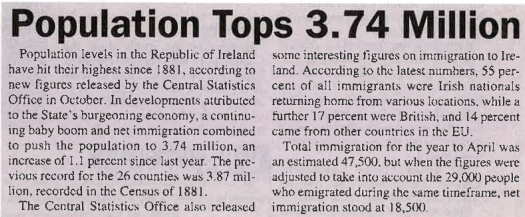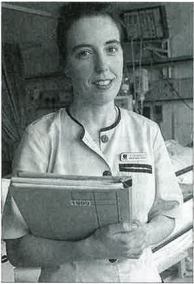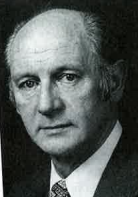Jack Lynch Dies in Dublin
There were fond tributes from government officials for former Irish Taoiseach (Prime Minister) and Fianna Fáil leader Jack Lynch, who died in Dublin on October 20 following a long illness. The Dáil (Parliament) observed a minute’s silence in memory of the 82-year-old former politician, and Taoiseach Bertie Ahern said: “On behalf of the Fianna Fáil party, we say a fond farewell to the real Taoiseach who brought such honor and quiet ability to that challenging task.
“His gentle and courteous demeanor, even in the midst of great adversity, endeared him to the public, and his great political triumphs were in many ways a tribute to the great personal esteem in which he was held.”
A native of Cork and an All-Ireland football and hurling medal winner in his youth, Lynch was leader of Fianna Fáil from 1966 to 1979, during which time he was Taoiseach in two governments led by the party, from 1966 to 1973, and from 1977 to 1979. Prior to his stint as party leader, he held various ministerial portfolios in education, the Gaeltacht, industry and commerce, and finance.
His time as Taoiseach is remembered for his unequivocal stance on the worsening situation in Northern Ireland. Lynch’s policy was one of non-violent intervention, and he told his party that one of their first aims should be “to secure by agreement the unification of the national territory.”
Following the 1969 Apprentice Boys march in Derry, and the sustained fighting which broke out, Lynch warned the British government that his administration could “no longer stand by and see innocent people injured and perhaps worse.” To this end, he announced that he was setting up military field hospitals on the Border, and sending local defense and FCA units to patrol the area. After the Bloody Sunday massacre of 1972 he recalled the Irish ambassador to London in protest. Lynch also presided over Ireland’s entry to the European Economic Community in 1973.  He resigned as leader of the Fianna Fáil party in 1979, following months of speculation over increasing support for Charles Haughey as a potential leader and diminishing voter support for the party.
He resigned as leader of the Fianna Fáil party in 1979, following months of speculation over increasing support for Charles Haughey as a potential leader and diminishing voter support for the party.
Irish Nurses Strike for Better Pay
Hospitals in Ireland came to a standstill in late October when the country’s 28,000 nurses started strike action over a long-running pay dispute. Despite last minute talks between union representatives and the government, the industrial action went ahead as scheduled, making it the first time in the history of the State that nurses had gone on strike. A spokeswoman for the Irish Nursing Organization said on an Irish radio program that the strike would continue for as long as it took the government to concede on pay demands.
Some hospitals throughout the country saw nursing coverage drop to as little as one-fifth of normal levels, and all hospitals advised patients with non-emergency cases to stay away. Local chapters of the nurses’ unions reached their own agreement with their area hospital about nursing coverage. Emergency coverage was provided, however, and most strike committees worked out emergency plans with employers.
One picketing nurse with a 30-year work record, interviewed outside Tullamore Hospital, told reporters that she never expected to find herself on strike. “It’s cold but at least it’s not raining,” she added. “Maybe it shows that the Lord does look down on us kindly in some way.”
Another striker, interviewed outside St. James’ Hospital in Dublin said: “We’re all worried about our patients. But at the end of the day we’re here for them as well, because if we aren’t able to care for them there will be nobody left to do that job.”
Representatives of the nursing unions say that pay increases granted to members of the profession in the past three years still leave nurses lagging well behind other health service professionals. The government, however, are apparently concerned that if they give way on nurses’ demands, other public sector workers — including teachers and gardai (police) — will follow suit and file claim for more pay. At press-time, there were indications that the State’s 40,000 teachers would consider recommending a review of current salaries. The president of the Association of Secondary Teachers in Ireland, Bernadine O’Sullivan, said: “Both nurses and teachers make valuable contributions to society.”♦


Leave a Reply